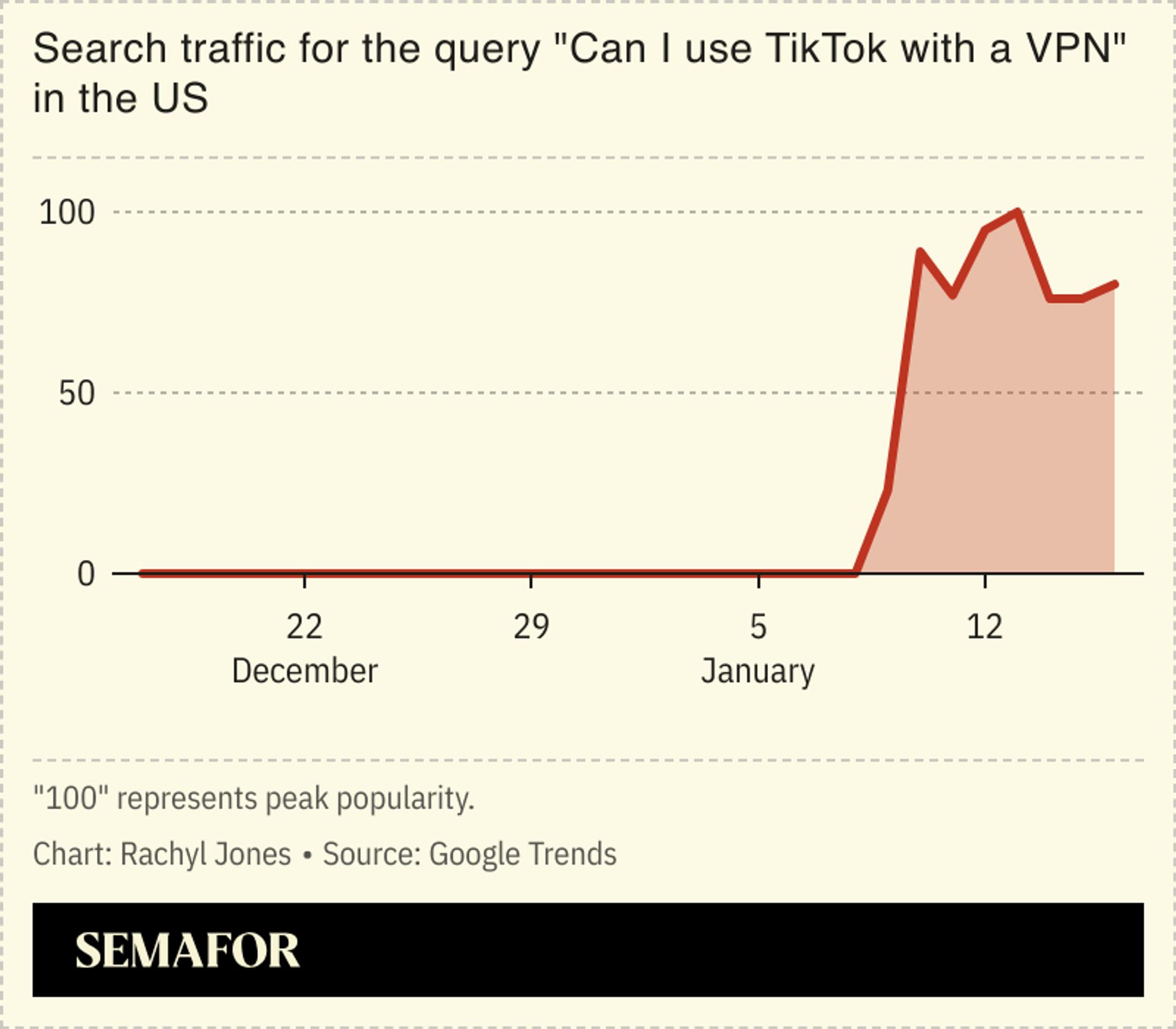The News
Gen Z is prepping for their own social doomsday. The US Supreme Court today unanimously upheld the law forcing TikTok to part from its Chinese parent company or face a ban on US soil. With only two days until that law takes effect, users are finding creative ways to protest the government’s sanctions and bypass the impending firewall.
If TikTok shuts down its US services on Sunday, some Americans will likely turn to virtual private networks, or VPNs, which replace a device’s IP address with one from another location. Internet searches that include the words “TikTok” and “VPN” have skyrocketed in the last week, Google Trends shows. The hope is that logging into TikTok, which Washington sees as a national security threat because of its Chinese ownership, from an IP address associated with another country would allow users to access their content.
“TikTok would probably allow that,” said Karrie Karahalios, who teaches computer science at the University of Illinois. “They want people to look at the content regardless of where they are.”

TikTok is “part of the popular culture right now,” she added. “If the people you talk to every day use TikTok, if you get your news from there, it’s hard to walk away.”
In an effort largely seen to poke fun at the US government, TikTokers have also flocked to another social media app with even closer ties to the Chinese government. Xiaohongshu — which translates to “little red book” — is considered the Chinese equivalent of Instagram and has topped Apple’s US App Store charts all week. The upshot — TikTok users are fighting tooth and nail to keep their beloved app, and it might work.
Meanwhile, President-elect Donald Trump has vowed to save the platform and will be sworn into office a day after the ban takes effect, with TikTok’s chief executive watching from the wings. Trump has floated ways to keep TikTok going while the Biden administration won’t enforce the ban, making it less likely that Americans will actually lose access to the social media app.
In this article:
Step Back
While Sunday is TikTok’s deadline, it might not be the end of the road. Ross Cooper, a business law professor at Georgetown, expects that when Trump takes office on Monday, he will ask the Justice Department to pause enforcement of the law so he can work out a deal with TikTok.
In such a scenario, the new administration could reexamine TikTok’s plan to address US national security concerns through Project Texas, the initiative that led Austin-based Oracle to handle the app’s US user data. If Trump deems this a “qualified divestiture,” which means the app no longer operates under or with a relationship to a foreign adversary, TikTok could remain in the US under the statute. Trump is also exploring an executive order intended to save the app, but it is unclear how that would measure up against the law.
If Trump is unable to stop the TikTok ban, the ramifications will be global as other countries may follow suit, said Tammy Madsen, who teaches strategic management at Santa Clara University. In 2023, France and Great Britain followed the US’s lead in banning the use of TikTok on government devices due to concerns over its connections with China.
Know More
At the heart of the court case and the issues around a sale is the value of an algorithm. The ability for TikTok to quickly deliver relatable content, and do so better than its competitors, is the special sauce that captivated half of America.
During the Supreme Court hearing, TikTok argued the algorithm is an editorial expression and therefore protected speech — an argument that didn’t hold weight in the end. ByteDance, TikTok’s parent company, has said it will not sell TikTok with its proprietary algorithm, leaving buyers with a shell of an app. A new owner would have to implement their own algorithm, but it is unclear if users would continue returning to the app without the level of curated content they once received.
Rachyl’s view
Concerns around TikTok cropped up in 2019, centered around data privacy. Trump got involved, then Biden, and Congress, and Trump again. What’s gotten lost in the politics of it all is that original concern about data privacy.
Sure, it’s a phrase that’s been hammered to death by Congress and pundits in recent years, but more so in connection to China stealing Americans’ data like some scary, masked burglar. What’s at the core is a valid concern — that information about people, their habits, routines, political affiliation, financial status, and health is valuable. We haven’t yet totally fathomed all that bad actors can do with it.
China isn’t the only problem here. There’s room to educate consumers, question lawmakers, and pay closer attention to what American companies do with that information as well.
